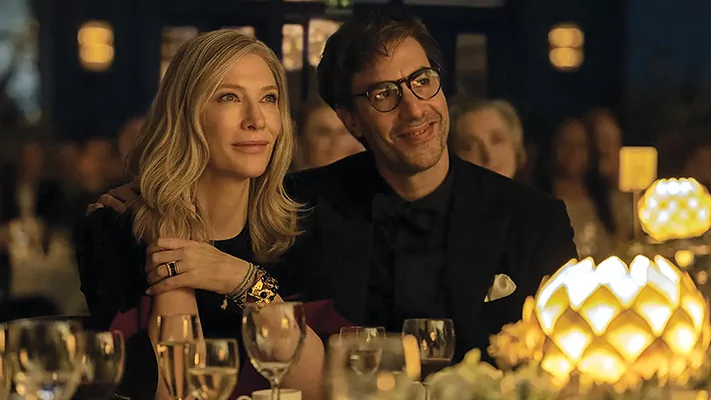
To watch Apple TV+’s new limited series Disclaimer is to observe the streaming era at its most ambitious and maddening. The show’s creator, Alfonso Cuarón, is the famed cinematic visionary behind such masterworks as Children of Men (2006) and Gravity (2013). Its leading performers, Cate Blanchett and Kevin Kline, are the long-beloved winners of basically every acting award on the planet. By all rights, the new production ought to be one of the high points of the television year, a stylish thriller that spares no expense and shimmers with star power. Yet the series is just plain awful: poorly written, badly acted, and so bizarrely stylized that one fears for Cuarón’s long-term prospects. If Disclaimer is the auteur’s first and presumably best streaming service idea, what viewing horrors might the future hold?
The show tells the story of Catherine Ravenscroft (Blanchett), a renowned documentarian living in London with her husband, Robert (Sacha Baron Cohen), and son, Nicholas (Kodi Smit-McPhee). What appears to be an idyllic existence is interrupted when, one evening, a mysterious post arrives bearing a stranger’s self-published novel. No mere vanity project, the book is instead a recounting of Catherine’s darkest secret: 20 years ago, vacationing abroad, our heroine conducted an affair that ended in tragedy. Who is the novel’s author, and what does he or she want? More importantly, how can Catherine salvage her family when a malevolent antagonist seems intent on exposing her?

The answer to the first of these questions comes right away. The novel is the work of Nancy Brigstocke (Lesley Manville), the since-deceased mother of Catherine’s long-ago fling, Jonathan (Louis Partridge). Catherine’s tormentor is the young man’s father, Stephen (Kline), who soon graduates from mailing his wife’s book to distributing scandalous photographs from the decades-old intrigue. While the bulk of the show’s action follows Catherine and Stephen as they navigate their present-day hostilities, the series returns regularly to its protagonist’s ill-fated holiday. There, played by the 31-year-old Leila George, Catherine splashes in the Mediterranean with her new lover, then-5-year-old Nicholas in tow. As the viewer learns early on, the affair ends when Jonathan drowns while pulling Nicholas from the sea. For reasons that become clear only gradually, Catherine fails to alert a lifeguard that her paramour is in trouble, thus setting in motion the chain of events that will lead, 20 years later, to her harassment-via-book.
Disclaimer’s Italian scenes, by far the production’s best, are sumptuously, and erotically, filmed, as well as engaging. But can we believe them? The series’s source material is, after all, the slippery 2015 bestseller by Renée Knight, no paragon of narrative reliability. Like many of that decade’s beach reads, Knight’s novel skirts the edges of authorial trustworthiness rather than settling there for good. And what are we to make, for that matter, of the “sexual violence” trigger warning that precedes each episode of the show? I will not spoil the ending, but suffice it to say that something serious is amiss. Our heroine appears, at a glance, to be a narcissistic near-murderer who lies to her family in an act of shameless self-preservation. If that plot feels out of step with prevailing political orthodoxies, well, it does so for a reason.
Apple TV+ has specialized, in recent years, in tight-lipped thrillers that make their living misdirecting the viewer. Silo, currently gearing up for its second season, is so devious that one can’t pin down its main character for the first four or five episodes. This summer’s Presumed Innocent remake necessarily holds its fire for a gasp-inducing finale. Watching Disclaimer’s exceptionally well-made trailer, one expects a pulpy delight of exactly that sort. Revenge, posh accents, and sun-dappled romps — what’s not to like? The problem is that Cuarón began with a postmodern clunker and has produced an overwrought, heavy-as-lead telenovela. Had the filmmaker ignored Knight’s metafictional hijinks, he might have delivered a work of breezy genius. Instead, the production sags beneath artistic “choices” designed, one supposes, to spruce up the book’s subpar material.
To begin with, Cuarón grants his performers far too much leeway, allowing, for example, Manville to shriek like a banshee and Kline to mime tossing hand grenades as he sets about wrecking Catherine’s life. (Seriously.) As for Blanchett, she has long been the kind of Thespian-with-a-capital-T who can’t slice an apple without making “acting” faces. Given the right material, say, 2022’s weird and wonderful Tár, the Australian’s mannered work can enthrall. Here, permitted to chew the scenery with an overmatched Baron Cohen, the Oscar winner is as soullessly precise as a digital clock. If deranged mortification is what we want, by God, Blanchett will fake it for us.
Yet even if its acting were flawless, Disclaimer would still suffer beneath one of the most repellent screenwriting and directorial choices in recent memory. Accompanying the series’s action is a stilted, near-constant voice-over track that describes what audiences are plainly seeing on-screen. So stupidly literal is this narration that I had to check whether I had enabled Audio Description for the Blind by mistake. An example: Midway through the second episode, Catherine cooks and then discards a sole meunière while waiting for her tardy husband to come home. Never mind that we have just watched Blanchett sigh and check her phone half a dozen times. We must be told explicitly that “Robert has not replied to your calls or texts. This troubles you.”
Was Disclaimer made, as my wife jokingly suggested, for extraterrestrials new to this planet? I can’t foreclose the possibility. The more likely answer, however, is that the show exists because of two distinct but related economic realities. In the streaming era, “content” is king, and few bestselling novels will escape the adapter’s pen. Yet the remaining middlebrow books of the last decade are #MeToo provocations that feel silly and dated already. Hence, perhaps, Disclaimer’s otherwise inexplicable risk-taking. A better-than-average television platform, Apple TV+ will surely turn out as many hits as misses in the coming years. Still, if I were in charge of Cuarón’s multiyear deal, I’d be worried.
CLICK HERE TO READ MORE FROM THE WASHINGTON EXAMINER
Graham Hillard is editor at the James G. Martin Center for Academic Renewal and a Washington Examiner magazine contributing writer.





